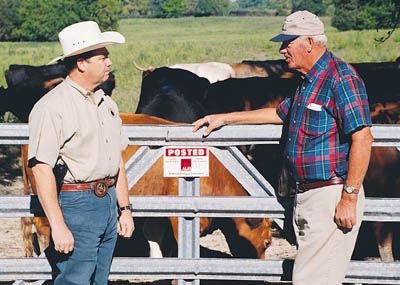Cattle Rustling On The Rise

The number of cattle stolen in Alabama has almost doubled in the past two years, and one Montgomery County Farmers Federation member can testify when it happens, it hits you where it hurts most–your bank account.”They’ve hit me twice this year,” said Morris Boyd, 62, who has 162 head of brood cows on his farm south of Montgomery near the Snoudown community. “In all, it’s probably set me back close to $12,000. That doesn’t include what I could have made off the calves those cows would have had the next few years. It just makes me sick, and it makes me mad.”Robert Holley, chief investigator for the Alabama Department of Agriculture and Industries, said in 1999 there were 116 head of cattle stolen in the state. In 2000, the number jumped to 160, and so far this year, the number already has exceeded 200 head.”Typically, they steal calves that weigh 400-500 pounds,” Holley said. “A lot of stockyards, particularly in north Alabama, have had cattle stolen this year.”
But recently, most cattle have been stolen from farms, he said.”Usually, they’ll go in and pen the cattle in the farmer’s own catch pen,” Holley said. “The best way around that is to have your catch pen close to your house where you can keep an eye on your cattle.”Alabama Farmers Federation Beef Director Raleigh Wilkerson said he believes the increase in cattle theft has a direct correlation with the increase in cattle prices.”Now that cattle are bringing a good price, it seems like the thieves are willing to take more risks because the cattle will sell for more,” Wilkerson said. “One of the best deterrents for cattle thieves is branding and keeping gates and catch pens locked.”Holley said most thieves usually will separate the branded cattle and leave them behind when they steal part of a herd. He said brands must be registered with the Alabama Department of Agriculture and Industries which requires the brands to be recertified every five years.”So even if you have a brand you need to make sure it’s registered and that it’s current,” Holley said.But most cattlemen in the state are probably like Boyd, who knows each of his cows on sight, but has a hard time describing them in specific terms that can be used to identify them after they’re stolen.”I know one of the ones they stole was a red cow I could recognize anywhere, but how do I tell someone else what she looked like?” Boyd said.In January, the thieves struck when they penned five calves and three cows using Boyd’s catch pen. After that incident, he put padlocks on the gate to the pasture he rents about four miles from his house.In early September, the cattle rustlers struck again. This time, they lifted the locked gate off its hinges and loaded up eight cows that weighed about 1,000 pounds each plus 11 calves that weighed about 400 pounds each.”I really don’t know what to do about it,” Boyd said. “I can’t stay out here 24 hours a day. The second time they hit me, I had gone to the pasture late that afternoon and everything was fine. The next morning, the gate was off the hinges, and they had stolen more of my cows.”Boyd said he believes the stolen cattle were sold at auction, probably out of state. He said he doesn’t hold out much hope of getting his cattle back, but he hopes reward money being offered by Alfa Farmers and a group of private producers will act as an incentive to get someone to talk about the crime.The Alabama Farmers Federation offers a $1,000 reward for information leading to the arrest and conviction of persons committing theft on the property of any Alfa Farmers member who has the Federation sign posted. Boyd and other cattlemen in his area have added $400 more to the reward.The Federation signs are available by contacting the Department of Organization at 1-800-392-5705, ext. 4272. They sell for $3 each, which includes shipping.Livestock theft in Alabama is a Class C felony punishable by up to 10 years in prison. Holley said cattlemen should report any theft immediately to their local sheriff’s department and call his office at the Department of Agriculture at 1-800-642-7761, ext. 7208.
